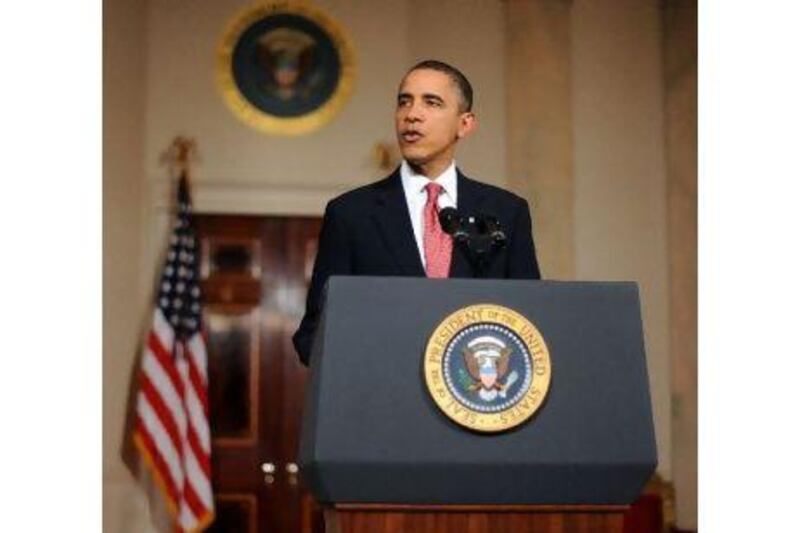[ More on the unrest in Egypt ]
WASHINGTON // The US president's call for an immediate transition of power in Egypt is the result of an evolution in US thinking concerning Hosni Mubarak's regime and a determination not to be caught behind the curve for a second time in a month by popular Arab discontent.
But it also suggests that Barack Obama now needs to give substance to his much-publicised speech to the Muslim world in 2009 in Cairo in which he not only promised a "new beginning" in relations between Muslim countries and the West, but declared his "unyielding belief" that all people want certain things.
________________________________________
[ PICTURES, AUDIO and VIDEO reports from Cairo ]
________________________________________
Among those desires, he said, were "the ability to speak your mind and have a say in how you are governed; confidence in the rule of law and the equal administration of justice; government that is transparent and doesn't steal from the people; the freedom to live as you choose."
Mr Obama made it a point in his Cairo speech to stress that forms of rule could not be imposed on other nations, thus separating his presidency from the administration of George W Bush, his predecessor, whose attempt to impose democracy in Iraq was widely derided.
But since Mr Obama took office more than two years ago his administration has been criticised for too great a reluctance to step into the democratic breach in the region. Washington's handling of popular protests in Iran in 2009, and Tunisia and Egypt this year, illustrated, for different reasons, that reluctance.
While there is no love lost between Washington and Tehran, the Obama administration, perhaps rightly, sensed that outspoken US support for Iranian protesters after elections there in June 2009 would undermine them.
But that only served to underline the dilemma for US policy makers when similar protests erupted in countries traditionally aligned with the US. Caught between continued support for long-time allies and responding to popular protests calling for almost exactly the same things that Mr Obama predicted they would two years ago, the US was slow to respond.
Only last week, as Egyptian protesters began to take to the streets, senior administration officials, from Joe Biden, the vice-president, on down, were still calling the Egyptian government stable and said they did not see any need for a change at the top.
But mindful of events in Tunisia last month, where an official US response to demonstrations there was still being formulated even as Zine el Abidine Ben Ali, the former Tunisian president, fled the country, the administration has tried to react faster on Egypt.
A shift in the US position was already evident on Sunday, when Hillary Clinton, the secretary of state, began calling for a peaceful transition of power, signalling that the administration had decided that change was inevitable.
But that position still seemed to hold a role for the current Egyptian leadership and was fast rendered irrelevant by continued and growing demonstrations in Cairo and elsewhere in Egypt.
On Monday, the White House called in around a dozen foreign policy experts from many think tanks in Washington to discuss the unfolding events. At the same time, a former US diplomat, Frank Wisner, who has close ties to Mr Mubarak, was dispatched to mediate with the Egyptian leader.
Mr Mubarak reacted by going on state-owned Egyptian TV Tuesday to announce his intention to step down, but not before the end of his term, in September, in what evidently was a snub to Washington.
A few hours later, Mr Obama appeared at the White House, 30 minutes, he said, after personally speaking to Mr Mubarak.
"Now, it is not the role of any other country to determine Egypt's leaders. Only the Egyptian people can do that," Mr Obama said. "What is clear - and what I indicated tonight to President Mubarak - is my belief that an orderly transition must be meaningful, it must be peaceful, and it must begin now."
It is clear the US has turned a corner in its position on Egypt. The question now is: how can US diplomacy ensure a peaceful transition in view of Mr Mubarak's determination not to step aside?
Steven Cook, a Council of Foreign Relations member who attended Monday's White House meeting, said: "Mubarak is a wily character. This has become existential for him and the people around him."
Mr Cook suggested that the US now needed to make an even stronger statement, but cautioned that US influence was limited.
"The US does not have a lot of leverage, but I can't imagine President Obama, or any other president, working as closely with Mubarak after this episode. It's time for Obama to get out and say [the events yesterday at Tahrir Square are] absolutely unacceptable. This will have consequences for US-Egypt relations."
And while he suggested it was likely the US would now place more emphasis on political reform in the wider region, "what's happening now only shows how limited our influence can be, even when we are speaking forcefully. When it gets down to existential issues, nobody is going to listen to us."





